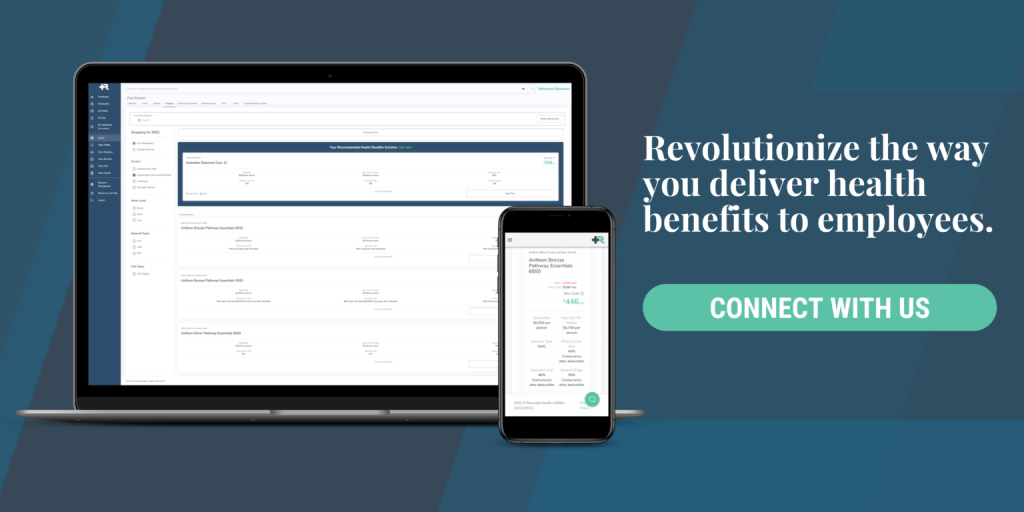7 Common ICHRA Misconceptions Debunked
By Mallory Meyer on Oct 31, 2024 3:39:00 PM

The Individual Coverage Health Reimbursement Arrangement (ICHRA) is a newer option that’s changing how businesses approach employee health benefits. Unlike the traditional group health plan, which often offers limited choices, ICHRA provides flexibility that can benefit both employers and employees.
But despite its advantages, ICHRA is still surrounded by some common myths. Are these misconceptions holding your organization back from considering this innovative solution? From setup complexity to compliance concerns, these myths may make ICHRA seem daunting when, in reality, it could be a perfect fit.
In this blog, we’ll dive into the most common myths about ICHRA and explain why it’s worth considering as a valuable alternative to traditional group health plans.
Understanding ICHRA Basics
ICHRA is reshaping how organizations approach employee health benefits. It offers flexibility and personalized options that traditional group health plans often lack. Here’s a closer look at ICHRA’s essentials.
Key Components of ICHRA
- Personalization: Employees choose the health plan that best fits their needs.
- Employer Control: Employers set monthly allowances, controlling costs while empowering employees.
- Tax Advantages: Contributions are tax-free, helping reduce medical expenses.
- Portability: Employees keep their plan if they change jobs, offering stability.
Eligibility Requirements
Not every business qualifies for ICHRA, but it’s accessible for many, from nonprofits to larger corporations. Employers can segment employees by classes, like full-time vs. part-time, to provide custom benefits for each group.
Compared to traditional group health plans, ICHRA offers a different approach to managing medical expenses. While group plans are one-size-fits-all, ICHRA gives each employee the freedom to choose their coverage. This empowers teams with tailored health benefits, ultimately enhancing satisfaction and supporting individual needs effectively.
Common Misconceptions About ICHRA
As ICHRA continues to gain traction, misconceptions can sometimes prevent organizations from fully understanding its benefits. By debunking these myths, companies can make more informed decisions about individual health insurance plans and how they can provide health benefits with flexibility and control.
Misconception 1: ICHRA is only for small businesses
It’s a common belief that ICHRA only suits small businesses, but this couldn’t be further from the truth. ICHRA is designed to be adaptable for companies of all sizes, from startups to large employers.
Large employers, like those with hundreds or thousands of employees, also benefit from ICHRA’s flexibility. For instance, some large corporations use ICHRA to provide health benefits to specific employee groups or to offer an alternative for workers who might need more tailored individual health insurance plans. By catering to different employee needs across various business sizes, ICHRA shows its versatility beyond small enterprises.
Misconception 2: ICHRA is too complicated to implement
Many employers worry that ICHRA might be too complex to implement. In reality, ICHRA implementation can be straightforward, especially with the right guidance. The process typically involves these simple steps:
- Setting Allowances: Employers decide how much they’ll reimburse employees for qualified medical expenses.
- Classifying Employees: Employers categorize workers, such as full-time, part-time, or seasonal, to align reimbursements with different roles.
- Communicating Options: Employers inform employees about their new health insurance options and how reimbursements work.
- Ongoing Support: Remodel Health and other providers offer resources to help employers set up and manage ICHRA plans easily.
With assistance from benefits specialists, employers can simplify the setup and focus on making sure their eligible employees are covered.
Read More | HSAs for Healthcare and Beyond
Misconception 3: Employees must purchase insurance from a specific provider
A frequent misconception is that ICHRA limits employees to a specific insurance provider.
However, ICHRA empowers employees by allowing them to select individual health insurance plans that fit their unique needs. This means employees aren’t restricted to any single insurance provider—they have the autonomy to shop on the open market or on an exchange, finding a plan that aligns with their healthcare needs and financial goals. This flexibility makes ICHRA an appealing option because it places choice back in the hands of employees.
Misconception 4: ICHRA limits employee benefits
ICHRA doesn’t restrict employee benefits—in fact, it allows employers to design packages that meet diverse needs. Unlike traditional group health insurance, where a single plan is chosen for everyone, ICHRA lets employees pick a plan based on personal priorities.
With ICHRA, employees can be reimbursed for a variety of qualified medical expenses, providing a level of customization that group health plans often lack. This personalized approach allows employees to select the coverage they need while also receiving reimbursements for expenses that matter most to them.
Misconception 5: ICHRA is not compliant with ACA requirements
Some believe that ICHRA doesn’t meet the requirements of the Affordable Care Act (ACA), but it’s actually designed to be fully ACA-compliant. ICHRA meets ACA regulations by giving employees access to individual health plans that satisfy minimum essential coverage requirements. This means employees who enroll in ICHRA plans have coverage that aligns with ACA standards, fulfilling mandates for both employers and employees. By meeting these regulatory standards, ICHRA ensures that organizations remain compliant without compromising their ability to offer flexible health benefits.
Misconception 6: ICHRA is only suitable for certain industries
Another misconception is that ICHRA only works for specific sectors, like tech startups or small nonprofits. However, ICHRA’s flexibility makes it suitable across a wide range of industries, from healthcare to retail, and even education.
For example, a large manufacturing company may offer ICHRA to provide health benefits for seasonal employees, while a nonprofit organization may use it to cater to a varied workforce with different health needs. These examples illustrate ICHRA’s adaptability, highlighting how organizations across sectors can use it to customize health benefits for diverse employee groups.
Learn more about how Remodel Health’s ICHRA+® can benefit your organization
Misconception 7: Employers cannot adjust reimbursements
Some employers think ICHRA reimbursement levels are set in stone, but this isn’t the case. ICHRA is designed to be flexible, allowing employers to adjust reimbursement rates based on different employee classes, such as full-time, part-time, or remote workers. This flexibility lets employers tailor their health benefits in a way that fits their workforce’s needs.
For instance, they can allocate higher reimbursement amounts to full-time employees while still offering reasonable support to part-timers. By adjusting reimbursement levels, companies can ensure that employees have support for their qualified medical expenses, creating a benefits program that evolves with their organization’s needs.
Benefits of ICHRA
ICHRA provides organizations with a modern approach to offering health benefits. The following are the key benefits of using ICHRA for both employers and employees.
Customized Health Benefits
ICHRA allows employers to personalize healthcare coverage for their teams. With it, they can tailor plans to different employee groups, ensuring each receives support that aligns with their specific needs.
Cost Control and Predictability
Employers have greater control over costs with ICHRA. By setting monthly reimbursement allowances, they can predict and manage expenses, making budget planning straightforward.
Boosted Employee Satisfaction
Employees appreciate having choices in their health benefits. With ICHRA, they select plans that fit their lifestyles, which can lead to increased satisfaction and improved retention.
Read More | Integrating ICHRAs with Medicare
Employer Perspectives
HRAs offer customization options that let employers design health plans tailored to different employee needs. Employers can choose which healthcare expenses are eligible, such as medical or dental costs, creating a personalized benefit package. Additionally, HRAs make budgeting and forecasting easier, as employers know the exact amount allocated for health expenses each year. This predictability supports better financial planning than a traditional health plan or health savings account.
Challenges and Considerations
While ICHRA offers many benefits, there are important considerations for employers to keep in mind. Understanding potential challenges helps in creating a smoother implementation.
Potential Pitfalls for Employers
- Initial setup can require time and resources.
- Communication with employees is key but can be challenging.
- Navigating compliance with health benefit regulations can be complex and requires attention.
Employee Understanding and Engagement
Ensuring employees understand ICHRA options is essential. Clear communication helps them make informed choices, boosting engagement and satisfaction.
Providing resources like informational sessions or FAQs can make ICHRA feel accessible and easy to navigate. When employees feel confident in their health benefit choices, they are more likely to appreciate and value the program, leading to better overall satisfaction.
Navigating Tax Implications
Employers must consider tax implications and reporting requirements. Understanding these can simplify compliance and enhance the overall experience of offering ICHRA as a health benefits solution.
With ICHRA, reimbursements are generally tax-free for both employers and employees, providing a cost-efficient benefit. However, staying up-to-date with IRS guidelines is essential to avoid unexpected tax issues.
Partnering with a knowledgeable benefits advisor can make navigating these requirements easier. This helps to ensure you remain compliant and focused on supporting your teams.
Debunking ICHRA Myths: A Path to Better Health Benefits
Adopting ICHRA as a way to offer health benefits can be a transformative step for your organization. By addressing common ICHRA myths and understanding the flexibility it provides, you open doors to more personalized, cost-effective healthcare options for your team.
This tailored approach means employees can select individual plans that fit their unique needs, helping boost engagement and satisfaction. For employers, ICHRA provides budget predictability and adaptability to scale benefits across different employee classes.
As with any healthcare plan, careful planning and clear communication are essential for success. Equip your employees with the resources they need to understand and navigate ICHRA confidently. Partnering with a benefits advisor can also help you navigate the setup and compliance aspects smoothly.
Remodel Health specializes in innovative, tailored healthcare solutions that empower organizations to offer meaningful, flexible benefits. With expert guidance, we make transitioning to ICHRA seamless and impactful.
Check out more resources
See these related articles

The basics of ICHRA
New to ICHRA? This guide covers the basics—what an Individual Coverage HRA is, how it works, and why it's a flexible option for modern health benefits.

Carriers are investing in ICHRA-specific and specialized health plans
Carriers are building ICHRA-specific plans to meet rising demand. Explore how these tailored health plans improve access, pricing, and employee choice.

What is ICHRA and How Does it Work?
This innovative approach to health insurance has been gaining traction since its introduction in 2020, and it’s about time we break it down.

